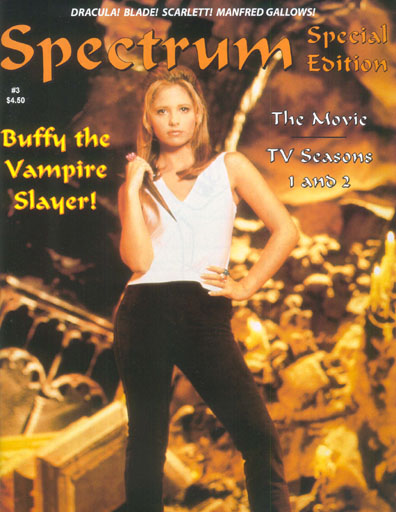|
BUFFY THE VAMPIRE SLAYER:
“Passion"
Spectrum episode guides contain credits (actors, writers, and directors), plot summaries, and commentaries on every episode of a given show. To give new readers an idea of the kind of commentaries that we do, here are our comments for “Passion,” the seventeenth episode of the second season. This is reprinted from Spectrum Special Edition 3 (though it originally appeared in Spectrum 14).
COMMENTS: By now the series is on a roll and has found a consistent, quality voice. “Passion” is sheer poetry, an extreme rarity for television. Astonishingly, Angel’s voice-over about the nature and consequences of passion succeeds (any faltering of the writing or narration would have quickly turned this episode into embarrassing camp). Angel’s indirect attack on Buffy is illogical from a battle strategy, but that’s the whole point: he’s being ruled by passion, as is just about everyone in this episode. Fortunately, Spike questions Angel about his methods; the audience wonders the same thing, and the writers are letting us know they’re in control of the plot and not allowing lazy or sloppy storytelling to take over. (This episode also covers a track that’s been hanging around for several weeks: why isn’t Buffy taking precautions against Angel’s ability to enter her room while she sleeps? One would think that would have been one of her first concerns.)
This episode is full of wonderful, awkward conversations, beginning with the Calendar/Giles bit where she lets it slip that she loves him. Later, when Calendar and Buffy talk, and Buffy expresses concern for Giles’s loneliness (and, subtly, Calendar’s, too, though Buffy can’t bring herself to say it), the air is crackling with pent-up emotion about to burst—the kind of energy so often exhibited in David Lynch’s screenplays, in which the seemingly simple dialogue masks (barely) a hidden (some would say “unconscious”) turbulence. Buffy cuts short the conversation, which does not diffuse the tension, but prolongs it. Later, Buffy’s conversation with Mom about her sexual encounter with Angel thankfully avoids the kind of simplistic, after-school-special sermon while at the same time shows the traumatic implications, refusing to allow Buffy to reminisce in fond, nostalgic terms. There’s also the great subtle humor (and fortunately, very subtle) in the double meanings of how Angel is “too old” for Buffy, about how he’s “changed,” and the like.
Cinematically, this episode has some equally poetic moments. The most beautiful is Angel’s slaying of Calendar before a large, multi-paned window from which the night landscape can be seen. The composition is wonderful—attention to such things is almost never exhibited on television (and rarely even in film, for that matter). Another powerful segment is Giles’s phone call announcing the death of Calendar. With Angel lurking outside to revel in Buffy’s pain, the camera stands alongside him for many of the shots. Such a sequence has been done many times before—focusing on the receiving end of the conversation. But often, in generic directing, the scene will eventually shift back to the caller. Here, we never see Giles’s end of the call, but learn all we need to know by watching Buffy. This may seem like a small thing, but it’s amazing how often television writers and directors will not recognize the advantages of using a subtler approach. The power of this virtually wordless scene becomes magnified precisely because of its lack of bombast.
We should also mention briefly that the score for this episode by Christophe Beck is especially effective. The final piano/choral composition works as a beautiful musical elegy for Calendar.
“Passion” is not only one of the highlights of Buffy’s second year, it’s one of the highlights of all dramatic television for the 1997-98 season. We don’t often say this about genre fantasy shows—even the ones we enjoy writing about—but Emmy voters should take note of this episode.
RATING: 5 (out of 5)
© Win-Mill Productions. All rights reserved.
|
